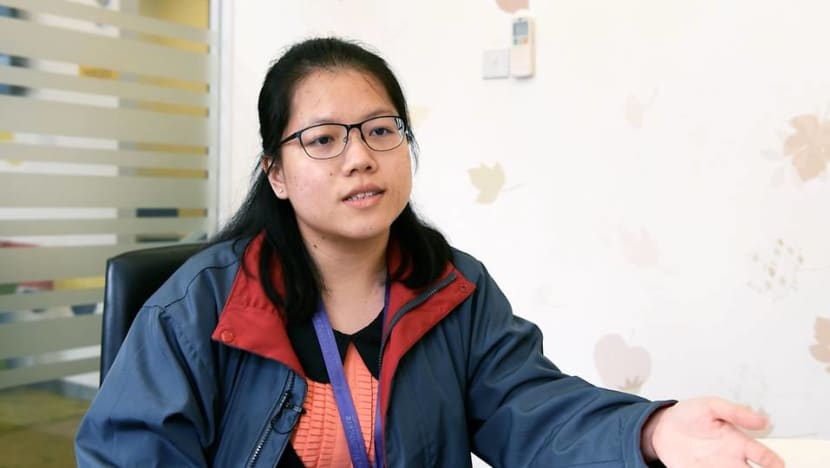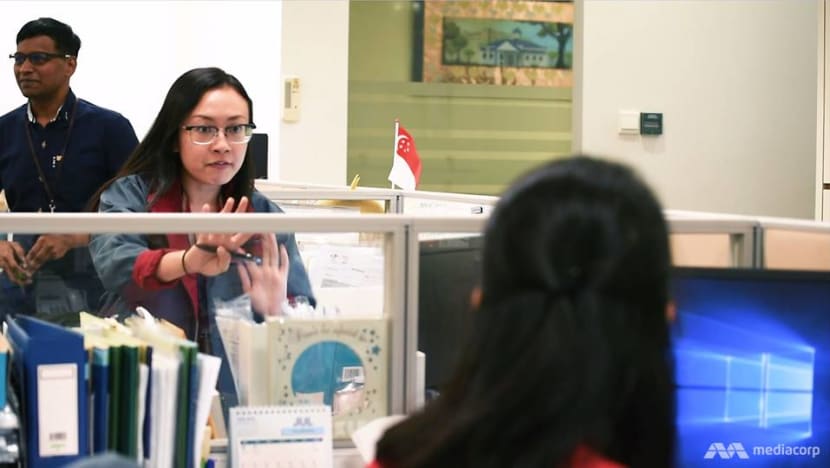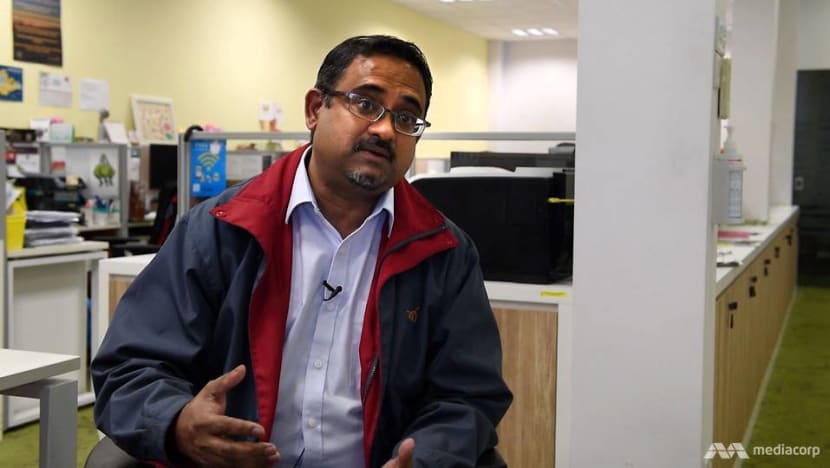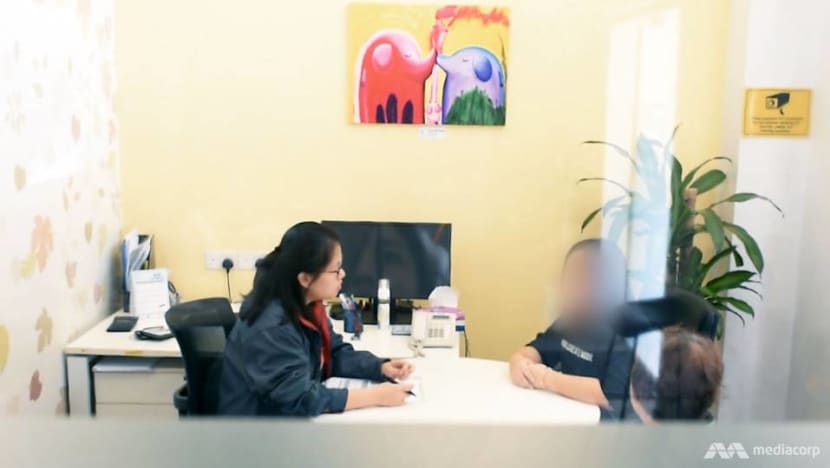Advocates for those in need: The Social Service Office where social and job assistance come together
A woman with no confidence to return to work, and others who need more than financial aid – such folks are in the good hands of one social service team, which seeks holistic solutions for clients in need.

Officers of the Social Service Office at Chua Chu Kang see an average of 12 to 14 walk-in cases a day, including residents of the nearby public rental flats.
SINGAPORE: She had written many letters to agencies before, but this one to SP Services was a matter of life and death.
The family of five that Ms Nalini Ramachandran was helping was having trouble paying the bills. They had a child on a ventilator 24/7, without which he could not breathe.
While they were already receiving financial assistance, the bills were coming up to S$500 a month. It was up to the social assistance manager from the Social Service Office in Chua Chu Kang to ensure their electricity supply was not cut off.
And this she did.
But that successful intervention was still just one step. The 50-year-old also wanted to help increase the utilities assistance for the family.

To her relief, her superior, assistant general manager Sajahan Jainulabdeen from the same office, agreed. Even then, Ms Nalini knew her work with the parents - both unemployed – was not done yet.
For all the assistance that she and her colleagues at the Social Service Office in Chua Chu Kang render to residents in need, not every problem is dealt with as easily, and not every case resolved happily – a reality that the officers, most of whom signed up for the job out of a sincere desire to help, have to grapple with.
One colleague, for example, was just about to process a case when his client passed on, leaving him saddened but determined to do his best for his other clients.
Their office – one of 24 across the island which bring social assistance closer to residents in need – sees an average of 12 to 14 walk-in cases a day.
Help for these clients, who include those in the nearby public rental flats, may involve working closely with other agencies and community partners. More and more, the officers’ work entails being “advocates for their clients”, said Mr Sajahan, 46.

And it isn’t confined to financial aid.
A growing number of younger people without jobs, including families with young children, need help. So the role of social service officers at Chua Chu Kang has evolved to include providing employment assistance.
JOBLESS FOR 10 YEARS
There are various reasons why people seek help in this aspect: Some were on contract jobs that ended, while others were working in a sunset industry.
“They want to continue in the same industry, (but) it’s not possible,” said Mr Sajahan.
There are many other circumstances that cause people to ask for assistance.
One of Ms Nalini’s clients, 41-year-old Noraisah Abdul Rahim, first came to the office with her husband to get help with paying their household bills in instalments.
He was earning roughly S$1,900, while Mdm Noraisah was a housewife who had not worked for 10 years. With better budgeting, they would be able to manage, “but it would be even better if Noraisah could find a job”, said Ms Nalini.
Having been jobless for so long, however – initially because of asthma, low blood pressure, leg pains, and her belief that her English was not good enough – had dented Mdm Noraisah’s confidence. So Ms Nalini supported the family with their bills, while encouraging her to explore employment options.
But instead of leaving the search to them, she looked for openings and found one possibility: A job as a library assistant.
It was work that Mdm Noraisah had done before and thus was familiar with, and her reaction to the news was: “I thought I was dreaming. And then I was very happy.”
WATCH: A peek inside the Social Service Office and its work (6:36)
She was also nervous, however, about the job interview. “Will I be all right? Can I speak English well enough?” she questioned herself.
Her husband shared her doubts. To convince him, Ms Nalini promised: “Don’t worry, I’ll help her. I’ll give her confidence before she goes for her interview.”
And she did – assuring Mdm Noraisah that she should stick with her “simple English” and that “if people use difficult words and you don’t understand, they’ll know and they’ll simplify their English”.
Mdm Noraisah got the job. In July, some four months after seeking help, she started working again.
Ms Nalini is not done with helping them, however. “For her to sustain (her job), I need to closely monitor her,” said the officer.
That means every week I call her … I want to hear from her how it’s been.
Only if her client is holding down her job after six months would Ms Nalini rate this as a successful case.

BENEFITS OF INTEGRATING ASSISTANCE
One year ago, things might have been handled differently.
The joint provision of social and employment assistance at the Chua Chu Kang Social Service Office began in October 2017 as part of a pilot at five offices (the other four are at Jalan Besar, Kreta Ayer, Taman Jurong, and Yishun).
Before that, clients had needed to make separate appointments with – and to repeat their stories to – officers from Workforce Singapore or the Employment and Employability Institute, who were deployed to the Social Service Office once a week.
The change in service model has been of “great value”, said Ms Nalini. “We’re more equipped, and we can monitor them (clients) closely.
“We give you financial assistance to help you bounce back from your most difficult times, and in return, you become self-reliant through the job assistance that we also provide you.”
This means resolving cases more holistically as the Social Service Office becomes more of a one-stop centre, added Mr Sajahan.

“We can move a client out of the cycle they’re in,” he said. “Concentrating on just financial (aid) doesn’t work most of the time.”
Mr Sajahan and his team of seven underwent training by the statutory board so that they can help clients find the right job. But the choice of “which is the best” is still up to the clients, he said, after the officers give them the options.
ALL CHIPPING IN FOR A 24-YEAR-OLD
With the onus on the individual to make his or her own decisions, some cases can be long drawn out.
Since October 2017, social assistance manager Goh Chai Yee from the Chua Chu Kang office has been working with the Tan family. They initially sought help to manage their household expenses as they were having issues paying their bills.
The 64-year-old father is a coffee-shop assistant and the sole breadwinner; the mother, 62, is a housewife, while their 24-year-old daughter has not had a regular job since leaving the retail line as a supervisor over a year ago.
Given the family’s circumstances, the office helped with their service and conservancy charges and utilities bills.
But after about a dozen conversations with the family, Ms Goh hasn’t yet been able to motivate the daughter, a graduate of NorthLight School, to secure financial stability through a full-time job.
The girl aspires to be a singer – although her only experience in the field has been one busking session and several unsuccessful auditions at restaurants and pubs.

And her parents have not pressured her to get a job. “They don’t spend a lot and have been able to manage their expenses with the income they’re getting, so they don’t feel like they are in a desperate situation,” said Ms Goh, 30.
In such cases where more must be done to help a family, the social service officers have discussions in their regular team meetings, working collectively to suggest ways forward.
Ms Goh told her colleagues she worried for the family’s future. “The father is quite old. If something happens to him, they’d lose their only source of income,” she said. But how to get his daughter to confront the reality of that situation?
For nearly 20 minutes, the team put their thinking caps on, offering suggestions to Ms Goh, asking if her client had perhaps encountered difficulties in her previous job.

Ms Goh has meanwhile encouraged the daughter to consider a part-time job so she can continue pursuing her dream. While the officer is determined to convince her client and her family about a full-time job, it would be “a big challenge”.
“Different people have different mindsets,” she said. “We cannot dictate what they do”.
WHEN MENTAL HEALTH IS AN ISSUE
Just as building rapport with clients is important but sometimes difficult, so too is the task of trying to understand what every person is going through. “Each client comes with a different set of issues,” noted Mr Sajahan.
This means having to “see a case from every angle”, as Ms Nalini put it.
For instance, one of her colleagues is helping a beggar who had not worked since three years ago – and during the interview, the man shed tears while talking about his mother who had died around the same time.
So the officer has been trying to establish whether the client is suffering from depression that he would need help with.

Such mental health issues are not uncommon.
Ms Goh has another case in which a woman, around 30 years old, has been unable to hold down a job because she would get into conflict with her colleagues, or because her supervisor would say her work was substandard.
“After talking to her for some time, we realised that she could be facing mental health issues, which would explain her problems at work,” said Ms Goh.
“Whenever she sees her friends going on holidays or having good meals, she feels very envious of them.
She would regularly call us or me – sometimes even several times a day – to seek advice on how to get a job (and) stay in a job.
Sometimes Ms Goh would talk to her for 30 minutes to an hour. “We’d give her advice, and the next day, she’d call again, asking the same questions.”
Initially, the client was resistant to the idea of seeking counselling at a family service centre. But as part of the action plan for continuing to receive financial assistance, she finally agreed to see a social worker and seek treatment concurrently.
“It’s still a work in progress,” said Ms Goh.

Mental issues aside, Ms Nalini said she sees different types of people seeking help. There are the motivated ones, who try to follow their action plan so that they do not have to visit the Social Service Office any more.
There are those who know they qualify for help and think, “Why not?”
And there are those who want to enjoy life instead of working hard. As one client told Ms Nalini after he did not adhere to his action plan, he “just didn’t want to work”. These are the individuals the Social Service Office cannot help indefinitely.
DIFFICULT MOMENTS, AND GRATITUDE
When clients are demanding or keep questioning why assistance is not granted, the morale of the officers is sometimes affected, admitted Mr Sajahan. They are also sometimes left wondering why a client “hasn’t been forthcoming with information”.
If an officer needs space or help to deal with the issues, Mr Sajahan or his team leader may take the case and manage the client themselves.
Above all, the team members support one another because the job of being a listening ear to clients in a rut can be “mentally very draining”, he noted.

There are also times when it can get ugly.
Ms Nalini said: “Sometimes people tell you off to your face, raise their voice and scold you in the presence of a lot of people. I had that recently.”
Even then, she said, it is important to remain patient. “Nobody wants to be difficult. There must have been some life stressors that triggered their behaviour – some prior not-so-favourable experience,” she explained.
I’d get frustrated, I won’t deny that, but I won’t show it to them.
It has been more than five years since she got into this line, having left her job as an English teacher because she thought “it would be lovely if I could work in a helping profession”.
And over the years, she has learnt how to calm agitated clients and win their trust when they see her desire to help.
It requires delicate handling on the officers’ part when advising their clients, agreed Mr Sajahan, stressing:
We’d never get to the point and say, ‘Why aren’t you doing this?’
“The client will just turn around and say, ‘You’ve never been in my shoes. You don’t know how it feels to not have food on your table. You wouldn’t know how it feels when my child cries and I don’t have money to buy milk’,” he added.

He has, however, seen tough times of his own, when his father lost his factory job during the 1980s recession.
And he witnessed how his father bounced back as a hawker and supported two families: Theirs and his late uncle’s family in India. “That made me realise that we can do something about our lives,” said Mr Sajahan.
Nothing gives his team more joy at work than seeing their clients achieve self-reliance and financial independence.
Said Ms Goh: “Sometimes they’re very appreciative of that. They come back and thank us, and send in their compliments.”
The chance to wield the personal touch with people was what made the chemistry graduate opt to work on the ground.
“You might see it as our job. But for some clients, whatever amount of help they get, to them it is very helpful in terms of managing their lives and their situation,” she said.
This article by CNA Insider was done in collaboration with Gov.sg


















